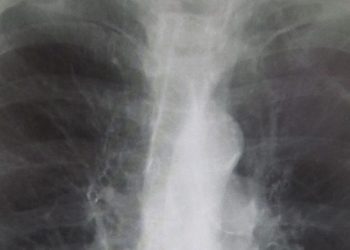Intermittent montelukast (singulair) fails to reduce medical visits in children with wheezing [WAIT trial]
1. Overall there was no reduction in unscheduled medical attendances for wheezing in children that received intermittent montelukast compared to children that received placebo.
2. The study identified a subset of population with the 5/5 ALOX5 promoter genotype that might be montelukast-responsive.
Evidence Rating Level: 1 (Excellent)
Study Rundown: Wheezing in the young pediatric population is commonly due to asthma, viral infections of the respiratory tract, and allergies, among other causes. While the majority of episodes are self-limited, acute respiratory distress that requires hospitalization is occasionally seen. Montelukast is effective in the subpopulation of asthmatics whose asthma have a leukotriene component. Results of a multicenter, randomized controlled trial (WAIT trial) were published in Lancet today. Compared to placebo, intermittent montelukast was not associated with reduction in unscheduled medical attendances overall. Subgroup analyses did reveal heterogeneity where children of a particular genotype appeared to have benefited from montelukast and had fewer medical attendances. The study was well-designed and adequately powered, with over 1,300 participants. Additional research is needed to allow further treatment stratification based on genotypes.
The study was funded by the Medical Research Council (UK) and National Institute for Health Research.
Click to read the study, published today in The Lancet
Relevant Reading: Efficacy of a short course of parent-initiated oral prednisolone for viral wheeze in children aged 1—5 years: randomised controlled trial
In-Depth [randomized controlled trial]: WAIT is a multi-center, randomized, placebo-controlled trial that assessed whether intermittent montelukast reduced unscheduled medical attendances for wheezing in the pediatric population. A total of 1358 children were stratified to either a 5/5 or 5/x+x/x ALOX5 promoter genotype, then randomized 1:1 to receive either intermittent montelukast or placebo for 12 months. Parents were advised to administer montelukast or placebo at the onset of each viral cold or wheezing episode. The ALOX5 gene encodes 5-lipoxygenase, which is the rate-limiting enzyme in the cysteinyl leukotriene biosynthetic pathway. The primary endpoint was the number of unscheduled medical attendances for wheezing episodes.
Overall, no significant difference was observed in mean medical attendances between the montelukast group and the placebo group (2.0, standard deviation SD, 2.6, vs. 2.3, SD 2.7; p=0.06). Additionally, no significant difference was recorded between the montelukast and placebo groups for the number of children who had at least one unscheduled medical attendance for wheezing episodes the number of wheezing episodes, or the duration of wheezing episodes. There was a slight increase in time to first hospital admission with montelukast (p=0.04).
In subgroup analyses, children of the 5/5 ALOX5 promoter genotype had fewer unscheduled medical attendances for wheezing episodes (2.0, SD 2.7 vs 2.4, SD 3.0, p=0.01). This possible benefit was not observed in children of the 5/x+x/x ALOX5 promoter genotype.
More from this author: New dengue fever vaccine effective in phase 3 trial, Insulin pumps more effective than multiple daily injections in type II diabetics [OpT2mise trial], Heart attack hospitalization rate in China quadruples from 2001-2011, Vitamin D supplementation does not reduce risk of falls, ¹⁸F-FDG PET brain imaging could predict recovery in vegetative patients
Image: PD
©2012-2014 2minutemedicine.com. All rights reserved. No works may be reproduced without expressed written consent from 2minutemedicine.com. Disclaimer: We present factual information directly from peer reviewed medical journals. No post should be construed as medical advice and is not intended as such by the authors, editors, staff or by 2minutemedicine.com. PLEASE SEE A HEALTHCARE PROVIDER IN YOUR AREA IF YOU SEEK MEDICAL ADVICE OF ANY SORT.







